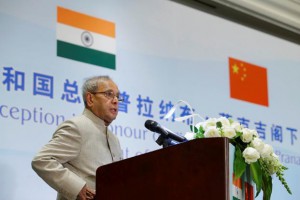India, China should be sensitive to mutual concerns : Prez. Mukherjee
 BEIJING: President Pranab Mukherjee has said India -China should minimize their differences and maximize convergences. President who is on a four days visit said both the country should be sensitive to mutual concerns.
BEIJING: President Pranab Mukherjee has said India -China should minimize their differences and maximize convergences. President who is on a four days visit said both the country should be sensitive to mutual concerns.
Expressing satisfaction over the growing ties between the two countries, he said these relations are steadily diversifying in new arena including annual military exercises and greater china investment in India and vice versa.
Making a strong pitch for people centric partnership for qualitative transformation of Indo-china relationship, the president said the two nations must have trust based on mutual respect. He called for promotion of travel, digital exchanges and common approach to global and developmental issues.
Against the backdrop of China’s reluctance to back India’s candidature for membership to the Nuclear Suppliers Group (NSG), President Pranab Mukherjee on Thursday delved into history and spoke about the “constant public support” that India had given China for its entry into the United Nations and for a permanent seat on the UN Security Council decades ago even as he called on both countries to “remain sensitive to mutual concerns”.
In a speech at the Peking University a day after he arrived in Beijing on the second and last leg of his four-day state visit to China, Mukherjee acknowledged that in the past decades, India-China relations had been “tested by difficulties and challenges”.
“But the determination of the Indian people to safeguard their friendship with the people of China has visibly endured. It was demonstrated in India’s early recognition of the People’s Republic of China in December 1949, the establishment of our diplomatic relations in April 1950 and India’s constant public support through the ’60s and ’70s for the admission of the People’s Republic of China to the UN,” he said.
Referring to the decades-old border dispute, Mukherjee said it was “natural” for neighbours to have a difference of view on certain issues from time to time.
“I consider it a test of our political acumen when we are called upon to draw upon our civilisational wisdom and resolve these differences to the mutual satisfaction of both sides,” Mukherjee said, addressing an audience comprising largely of Chinese students.
“Both sides should work with the aim of ensuring that we do not burden our coming generations by leaving our unresolved problems and differences to them. I am confident that by ensuring that these matters are not aggravated and by remaining sensitive to mutual concerns, we can minimize our differences and maximize our convergences,” he said.
Mukherjee stressed that political understanding was “vital” for a closer partnership. In India, there was bipartisan commitment to strengthening a partnership with China, he said, adding that frequent contacts between our respective leaders bear testimony to this.
“We have broadened the ‘common ground’ and learned to manage our differences,” the President said.The border dispute is a legacy of the brief but bitter war between the two sides in 1962. Many rounds of talks have not resolved the problem of an undemarcated border between the two countries.
Later on Thursday, Mukherjee is slated to meet Chinese President Xi Jinping and Premier Li Keqiang.In his speech, Mukherjee outlined eight steps to boost India-China relations, including people-to-people ties, particularly through expanded exchanges between the youth of both countries and the civil society.
“When Indians and Chinese understand the benefits of cooperating to address global challenges and as they perceive the advantages of building shared interests, we will, in doing so, unleash the potential of our mutually advantageous partnership. There are no limits to what our two peoples can jointly achieve,” he said.

